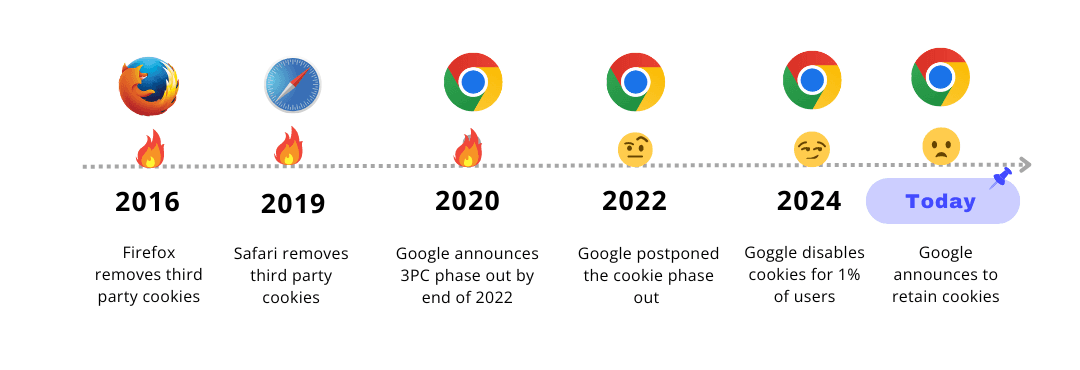The Final Verdict on Third-Party Cookies: What You Need to Know
6 Aug 2024

The Final Verdict on Third-Party Cookies: What You Need to Know
What has left the digital advertising world buzzing, Google has decided to keep third-party cookies alive, despite years of promises to phase them out. This shift in strategy comes as a significant development in the ongoing debate over privacy and digital advertising.
Let's dive into what this means for users, advertisers, and the future of online tracking!
What Are Cookies?
Before we delve into the specifics of Google's decision, it’s essential to understand the basics: what cookies are and their role in web browsing.
Definition: Cookies are small pieces of data stored by a website within a web browser to remember your activity and preferences, enhancing your browsing experience by keeping track of things like login details and site settings.
What about Third-Party Cookies and what’s the dilemma?
Definition: Third-party cookies are set by domains other than the one you’re currently visiting. They track your browsing activity across multiple sites, gathering data on your interests and behaviors.
This information is used to deliver targeted ads based on your online activities. While this can be useful for advertisers aiming to reach the right audience, it raises significant privacy concerns.
A History of Mixed Signals
Despite commanding over 90% of the search market, Google’s journey towards cookie deprecation has been rocky. The company has faced challenges balancing user privacy with the needs of advertisers, leading to delays and shifts in its strategy.

Why Google Planned to Phase Out Third-Party Cookies
Google initially pledged to eliminate third-party cookies to address several pressing issues:
Privacy Concerns: There was growing public criticism over the extensive collection and misuse of personal data facilitated by third-party cookies.
User Distrust: Users were increasingly uneasy about how their data was being shared across multiple companies.
Regulatory Pressure: There were increasing privacy regulations and demands for transparency and consumer-first practices.
Why the U-Turn after this lengthy debacle?
Well, several factors influenced this decision:
Unprecedented Economic Impact: The $237.86 billion digital ad industry has faced significant disruptions. There was a reported 52% loss in ad revenue as industries struggled to adapt to a cookie-less world. This affects all online businesses engaging in paid advertising, agencies, technology and more.
Difficulty in Finding Alternatives to replace the cookie: The tech giant struggled to develop a viable replacement for third-party cookies that balances privacy with effective advertising has proven challenging in this short period of time despite successful efforts
Focus on Improvements vs Removal: Instead of a complete phase-out, Google is exploring ways to improve the system, aiming to preserve user experience while enhancing privacy believing it’s a healthier approach to operating in a consumer-first environment.
What’s Next? Say hello to the Privacy Sandbox
In place of a full cookie ban, Google is introducing the Privacy Sandbox—a new approach designed to protect user privacy while still enabling effective advertising. Here’s what you need to know:
Enhanced Privacy: The Privacy Sandbox aims to reduce tracking while still delivering relevant ads. It focuses on maintaining user privacy without sacrificing ad effectiveness.
Tools Like FLoC: Google plans to use technologies like Federated Learning of Cohorts (FLoC) to group users into interest-based cohorts, rather than tracking individuals. This method offers a way to serve targeted ads without compromising individual privacy.
For example, if you own a gym and want to promote offers, FLoC might group users who frequently visit health and fitness websites into a cohort. You can then target ads to this cohort, ensuring your promotions reach potential clients while preserving individual privacy.
Collaboration with Regulators: Google will work with regulators to ensure that its new approach aligns with privacy standards and balances business needs with user experience.
What Should Brands Do?
Brands are navigating such strong forces of change in the industry and the third-party cookie developments are one that many closely observed for several years. For brands navigating this shifting landscape, there are more viable strategies than relying solely on third-party cookies. It’s time to diversify and not put one's eggs in one basket.
Here are some tips:
Leverage First-Party Data: Focus on collecting and using data from your own audience to drive your marketing strategies. This can be data from your website, apps, surveys, emails and loyalty programs which can be used for personalised targeting tailored to the customer.
Invest in Contextual Advertising: Target ads based on the content of the page rather than user behaviour. This might seem like a more organic strategy since the material being consumed is a strong indicator of who your shoppers are and where to find them.
Explore Brand Partnerships: Collaborate with other brands to expand your reach and share audience insights. The old-school tactic remains a goodie. Collaborations are still very powerful and exist at the heart of human relationships.
Double down on CRM Platforms: Use customer relationship management tools to better unify customer profiles, segment specialised segments and engage with your audience in a timely and personalised manner
While Google's decision to retain third-party cookies might seem surprising, understanding these changes and adapting your strategies accordingly, the entire DTC ecosystem can and will continue to thrive in the evolving digital advertising landscape.
Speak to us here at Splashup to help bring your brand in front of the right shopper, at the right time, while placing shopper privacy at the heart of every customer experience. Splashup.co/join
Serendipitous discovery experience shoppers actually love
Getting started is easy. Just complete your brand profile, and we will do the rest.